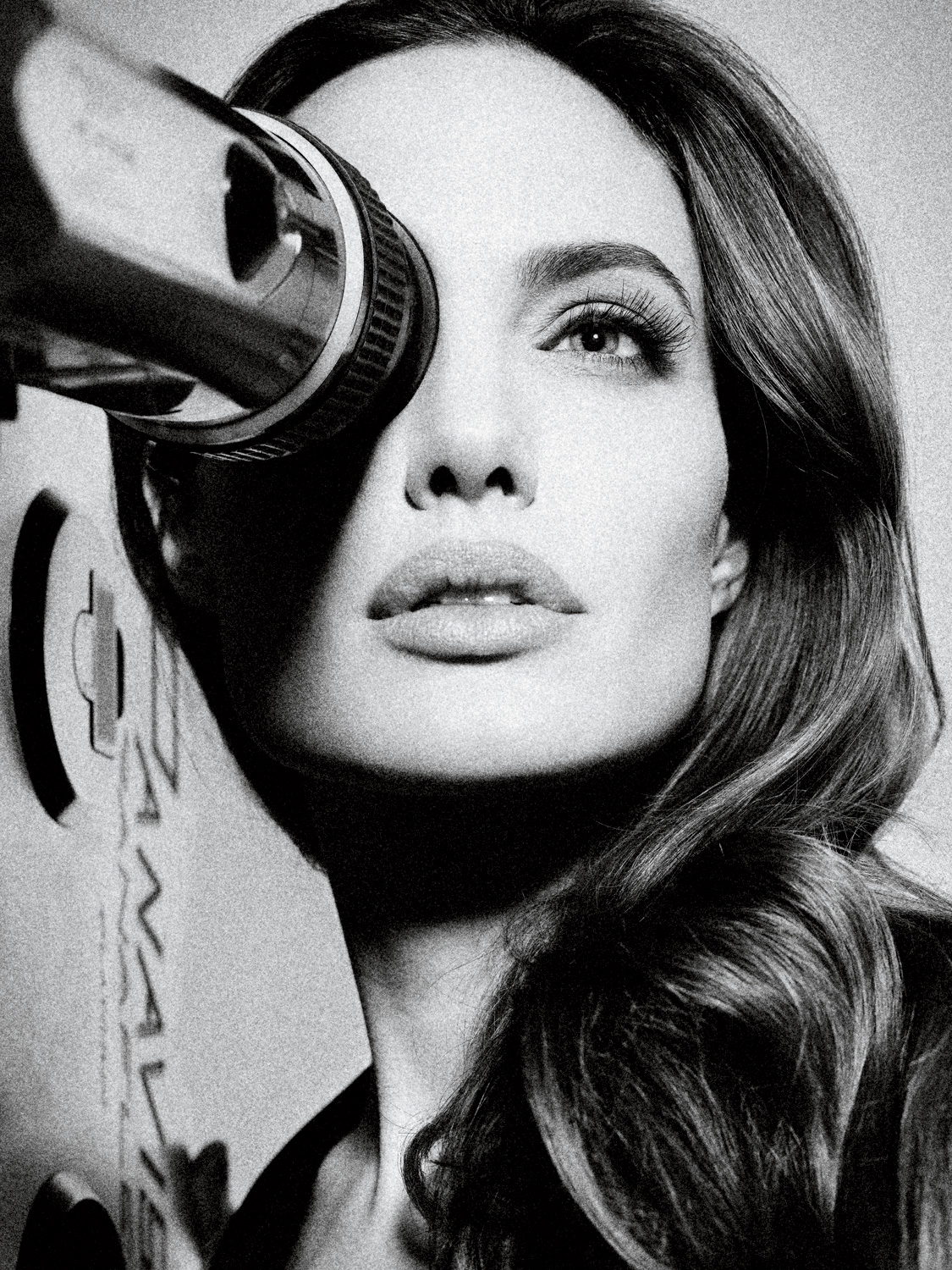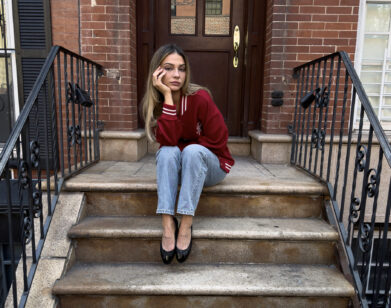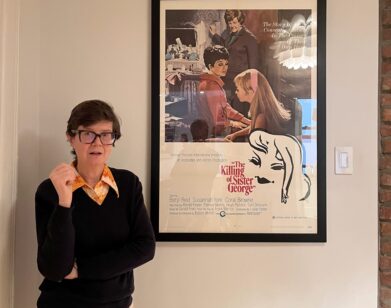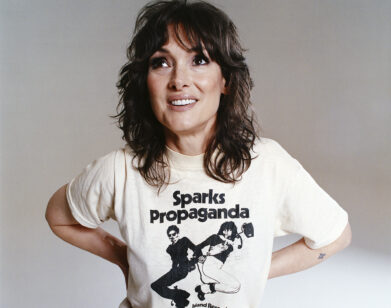Angelina Jolie
Can Angelina Jolie get people to see one of her movies if she isn’t actually in it? Jolie’s feature film debut as a director, In the Land of Blood and Honey, will reveal whether the world’s most famous movie star has as much command over the screen behind the camera as she does in front of it. But despite the fact that Jolie doesn’t appear in the film, it’s very much her vision. She came up with the story and wrote the script, and the subject, the Bosnian war that devastated the Balkans in the ’90s, is something of an extension of her efforts as a U.N. goodwill ambassador, for which she has participated in dozens of humanitarian missions in such ragged places as Afghanistan and Namibia to advocate on behalf of refugees.
In the Land of Blood and Honey unflinchingly depicts all the brutality and horrors of the years of armed conflict, ethnic cleansing, mass rape, and a population under endless siege. Framed within that chaos is the story of Danijel (Goran Kostic) and Ajla (Zana Marjanovic), who had a relationship before the war and now find themselves on opposite sides of the conflict. The cast of unknowns, including Kostic and Marjanovic, many of whom experienced the war as young people, may not add Hollywood star power to the project, but they lend the film something perhaps of greater value: authenticity. Jolie felt a responsibility to get their story right, and wants the film, regardless of its critical reception, to serve as a conversation restarter about Bosnia, and, implicitly, to get people to think of that war against the relative successes and failures of other, more recent American interventions abroad.
Taking on a hot-button political topic has not been without its risks, even for someone with Jolie’s connections. Permission to shoot in Sarajevo in fall 2010 was briefly denied after the Bosnian group Women Victims of War claimed that the plot depicted a Bosnian female prisoner falling in love with the man who tortured her-a situation deemed unthinkable and distressing to survivors. After Bosnian officials read the script, the crew was allowed to shoot in the country’s capital, though most of the action was filmed in Hungary, where Jolie, 36, has spent much of the past year. She was in Budapest, where partner Brad Pitt was filming his zombie flick World War Z, when she spoke with Clint Eastwood, a filmmaker who is no stranger to the cinema of violence and tragedy. He directed Jolie in Changeling (2008), and the two hope to collaborate again someday.
CLINT EASTWOOD: I saw the film the other day and really enjoyed it. I thought what you did was great. I don’t think people will think that it is a first-time film.
ANGELINA JOLIE: Oh, thank you so much.
EASTWOOD: You must have had good influences along the way.
Jolie: Yeah, you being one of them. [laughs] When I was on set with you, I thought, God, Clint makes this look really, really easy. And it’s really not that easy. But you seemed to surround yourself with great people and let them do their thing and encourage it. And I had a great team and let them do their thing and they were amazing, so I got lucky.
What if it was me and I loved somebody from what became the other side? What would it take for me to go against my neighbor? Would I?Angelina Jolie
EASTWOOD: There is some heavy violence in this movie, which people don’t usually associate with a woman starting out on her first film, but they don’t know you as well as I do. [Jolie laughs] I was also really surprised at how good the art direction was. It really added to the authenticity and the feel of the whole thing.
JOLIE: Oh, Clint, thank you. And that’s Jon Hutman [production designer] and Dean [Semler, director of photography]. We had the good fortune that all the actors are from the area and lived through the war, so they could call us on it if it wasn’t right.
EASTWOOD: You got that feeling that everybody was connected to it in some way. The actors looked authentic. Either that or they were just brilliant, which maybe was the case as well.
Jolie: I’m biased, but I think they are a bit brilliant.
EASTWOOD: You actually wrote the story for this film from scratch-that’s one thing that I have never done. Did you take this from any particular piece of material?
JOLIE: You know, it was one of those funny things. I didn’t intend to write anything and I never wanted to direct anything. I didn’t even have Final Draft. I was just kind of messing around one day on my computer for fun. I had a lot of thoughts about intervention and justice issues and humanity, and I’d spent a lot of time with people after conflict. So it was kind of a meditation for me: What if it was me and I loved somebody from what became the other side? What would it take for me to go against my neighbor? Would I?
EASTWOOD: I don’t know how many movies have been made on the Bosnian war.
JOLIE: There have been some made, but in America they’re not known to be hugely successful. It’s not an extremely successful subject matter in Hollywood.
EASTWOOD: But your film is very educational in a sense because there’s very little on this particular conflict. We all know what World War II is, but this one, at least for us in this part of the world, isn’t as widely understood. It has a different effect on us. It’s like we’re studying a historical thing.
JOLIE: Well, I did write the script with the intention of getting an education. I mean, I made this movie for certain reasons, and I want people to discuss Bosnia whether they like the movie or not. I want them to revisit that time in history and learn about it, and I do think it’s important to discuss what happens when we don’t intervene or what kind of intervention is right or appreciating what happened in this society.
EASTWOOD: I do remember a lot of discussions at that time as to whether Americans should intervene or how much they should intervene and if we should do the same in every conflict.
JOLIE: It’s tough because I tried not to have a direct opinion-I’m not a politician. But I think that if you learn enough about a situation, you feel like there is no one clear answer of the best way, and you do know that there were certain things going on that, whether you intervened or not, were clearly handicapping certain people and allowing for certain things to go on too long. There were definitely some things that could’ve been handled a hell of a lot better than they were. It’s hard not to think, If we’d just intervened sooner then they wouldn’t have gotten to this point where that society is this broken . . . You know, even without boots on the ground, there’s a lot more that could’ve been done.
EASTWOOD: I agree, but it seems like the Western-world approach is to just jump right in, with little knowledge of what has happened . . .
JOLIE: And now they’ve come out the other side and they’re all moving forward, but there’s a lot of healing and a lot of support that’s still needed. Even just the world remembering, acknowledging, and supporting them and being a part of their futures in an integral, positive way, as opposed to just kind of letting it stir and settle again.
EASTWOOD: Well, the only time that I was ever in Yugoslavia, Marshal Tito was running the show then, and everything was moving along quite smoothly at that time. This was in the 1960s.
JOLIE: They were Communist, right?
EASTWOOD: It was Communist. It was organized, as Tito was kind of an organized communist. If they didn’t have too much conflict then, they were suppressing it. I don’t know–everybody says a benevolent dictator is the greatest form of government, but there’s never been . . . Nobody can seem to find an example of a benevolent dictator. [both laugh]
JOLIE: Very good point.
What meant a lot was that they agreed that it wasn’t just people from one side wanting to tell the story.Angelina Jolie
EASTWOOD: I think it depends on whose eyes you’re looking through, but the thinking then was, When Tito goes, this whole place is gonna come apart.
JOLIE: Yeah, and they knew that. The international community knew; they knew after Croatia. They knew, they knew. And it was no surprise to anybody that it was coming, that it would possibly be even that bad. I think they knew. I’ve been meeting a lot of reporters and people who covered it, and it was one of those horrible situations where there were a lot of great journalists on the ground, but there was not a lot of interest, and there was also intention to cover up some of the truths so governments would not have to intervene. I’ve been finding a lot of reporters who are actually very emotional about it because of where they were blocked.
EASTWOOD: It’s hard to believe that this is so recent. That brings an added sadness to it all.
JOLIE: It does. It was the ’90s, so we all know where we were and what we were doing and what we were thinking about. The cast, many of them are younger than I am, and they remember gunshots or a grenade in the backyard. They’ve lived a thousand more lives than I could ever imagine. Very young people. Very heavy people. But what’s amazing is that they’re extraordinarily artistic and vibrant. The Sarajevo Film Festival actually started during the siege. During the siege they made art and did plays and started a film festival, and their spirit was never broken somehow. They’re artists in a way that as another artist it’s really special to know them.
EASTWOOD: When did you decide that you wanted to direct the film? When I first read the script, I thought your intention was to act in it and play the girl. But then I hadn’t discussed it with you, so I didn’t know exactly where you were coming from.
JOLIE: I think I always knew it belonged to them, and I couldn’t do it. I had the crazy thought of directing it, and I kind of just couldn’t accept that. I never believed that I was the right person technically, but I couldn’t trust it away from me emotionally, so I ended up saying, “All right, we’ll send it to a few people from the area, and if they think it’s terrible we’ll shred it. But if they’re willing to make it with me, then maybe there’s some truth to it and they can help me do it and it won’t be wrong.” And then I was with Bernie [David Bernstein, first assistant director] when he started talking about the schedule, and I put my head in my hands. I think I didn’t know how I’d gotten there.
EASTWOOD: I think somehow your brain snapped and you decided, “Okay, I’m ready. Go.”
JOLIE: I don’t know if I ever actually thought I was ready, but I realized, “Oh, what am I doing? I’m doing this!” I think this business can be so much about, “What’s your next film?” and then sometimes we get lucky and we’re able to be smart enough to take a deep breath and say, “I just want to be an artist, and I just want to try something. I want to learn and I want to play and create, and I’m not actually sure of anything, but I just want to learn something new.”
EASTWOOD: Well, that’s the way to go. You just jump in headfirst and go for it.
JOLIE: Did you know you were going to be a director when you were acting?
EASTWOOD: I always knew I wanted to try it, but I had to wait for the right project. I just wasn’t ready to do anything.
JOLIE: But then you found a great one.
EASTWOOD: I finally found a small film, Play Misty for Me [1971], a small film-
JOLIE: Beautiful film. I love that film.
EASTWOOD: It’s about guy and a town and an image of conflict that was much more condensed. But yours is a more ambitious project. What I liked about the cast is that you could definitely tell they were not American actors doing the parts. It looked like they were right from there.
JOLIE: What was important to me and what meant a lot was that they agreed that it wasn’t just people from one side wanting to tell the story, because they were more the victims of the story. There were people from all sides who decided that they would come together, so it was Serbians from Bosnia, Serbians from Serbia, Bosnian Muslims, and Serbo-Croatians, and that was great. And you know, I did think about you a lot because we did it in the language of the area, what was called Serbo-Croatian and is now BHS [Bosnian-Croatian-Serbian]. And I remembered you talking about Letters From Iwo Jima [2006] and thinking, I know I somehow made this work, but I got confused often [laughs].
EASTWOOD: The idea of jumping into that with a whole different society and a whole different background is great fun. To me, doing Letters had that same feeling. The actors didn’t even speak English, so everything was filmed with interpreters. And the actors had never even known about the conflict in that case, because in Japan they never taught kids the story about World War II.
JOLIE: I didn’t realize that. That’s extraordinary.
EASTWOOD: But your actors pretty much had lived it.
JOLIE: They had. A lot of them remember it. Everybody was at a different age and remembered it in different ways, but a few of the cast and crew had gunshot wounds themselves. We had one beautiful, sweet young actress who’s just so full of life, and she lost 28 family members in the conflict, and yet somehow she’s emerged a shining light of a human being and not a dark, depressed person. I don’t know exactly how she managed that.
EASTWOOD: How do you get past depression at that state?
JOLIE: I don’t know. I don’t think I would be as strong as she was.
EASTWOOD: Well, it’s an extremely bold project from every angle, and as we were discussing, this particular conflict and the way the world is now . . . Of course, I’m trying to preach the idea that if we don’t pay attention to history we’re destined to repeat it.
JOLIE: Yeah. I believe that, too.
EASTWOOD: We discussed that a little bit in making [Eastwood’s recently released film] J. Edgar, too, because now we’re repeating everything that’s in that story, and that was back in the 1920s.
JOLIE: I saw the trailer for J. Edgar. I’m always curious to see what you’re doing. I thought it looked amazing. Are you happy with it?
EASTWOOD: Yeah, I am, but you know, I don’t know anything. [Jolie laughs] You never know objectively, so at some point you just kind of say, “Oh well,” and you turn it over to the public and see where it goes. I imagine you’re feeling that right now.
JOLIE: I’m trying not to think about it. I still don’t quite believe that it’s coming out, if that makes sense. I’m still not quite convinced. I saw the first trailer and I thought, Wow, that was such a real trailer! I think I was expecting not a real trailer. Or not a real poster, or not a real release date. I just think somehow it’s this wonderful, creative time and a piece of art I made with some friends, and . . .
EASTWOOD: And then you just put it on the shelf, and that’s final. But everybody’s really excited about In the Land of Blood and Honey. I think people are going to be amazed.
JOLIE: That means everything coming from you.
EASTWOOD: You will amaze them again.
The cast… they remember gunshots or a grenade in the backyard. They’ve lived a thousand more lives than I could ever imagine. Angelina Jolie
JOLIE: I’m just blushing that you’ve got such nice things to say. That means so, so much to me. I’m just glad you didn’t call me and whisper, “You know, I think you should just hide it.” You know? “Start over!”
EASTWOOD: No, no. I think it’s a tough movie and that it’s extremely well made, and tough movies that are extremely well made are very hard to do.
JOLIE: Well, thank you so much. Thanks for doing this. It’s so fun to talk, and I can’t wait to see you and everybody. We’ll just plan to get together and hang out.
EASTWOOD: Definitely. I miss seeing you. You have a good time over there, say hello to Brad, and I will see you when you come back west. And when do you get back to Los Angeles?
JOLIE: Maybe early December.
EASTWOOD: I miss your lovely face.
JOLIE: You too. It’s so nice to talk to you, and I hope we’ll find another project to work on together. I’d love to do something again with you.
EASTWOOD: Well, I’m always looking for something special that we can do. It’ll be great. But this time you’re directing. I’ll just sit in the back. Do you have any inkling of what you might do next? Does anything pop to mind?
JOLIE: Well, I’ve been writing and staying with the kids. I think I should learn French and be a better cook–basic really good life stuff. I think I’m like you. I’m always doing something. I never shut my brain off. I always have something going on. But I think I’m trying to–
EASTWOOD: You’re trying to slow down.
JOLIE: Well I haven’t worked since Blood and Honey.
EASTWOOD: Are you studying French with a class?
JOLIE: I’ve been studying on and off my whole life, and I figured, my kids can speak it, and it’s embarrassing that I can’t as well as they can, so now . . .
EASTWOOD: You’ve got to pick it up.
JOLIE: Now, I have to. I’ve kind of half tried everything. It’s like deciding to write something or deciding to direct or make a score of a film. It has to become a priority.
EASTWOOD: I’ve got Rosetta Stone in French.
JOLIE: Oh, we should have a competition! Which one of us can learn French first? Oh, we’ll do it! I’ll work on writing something that’s in French, you direct it, and I’ll speak it.
EASTWOOD: Okay.
JOLIE: And then we’ll have some time, and we’ll hang out with our families in France.
EASTWOOD: But then maybe you should direct the movie, because if I have to do anything in French, I can only do one thing at a time.
JOLIE: Well, we can take a really long time. Do it the very French way. We’ll just have short hours and relax a lot. It’ll be a three-year process of making the film.
EASTWOOD: I’ve got to learn French because I’ve been going there for years and still, the only words I know are the swear words.
JOLIE: Which can get you pretty far. A glass of wine and a few swear words.
Clint Eastwood is an actor and two-time Academy Award–winning Director.







